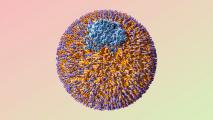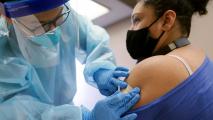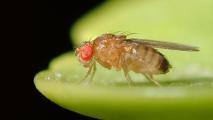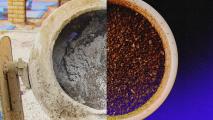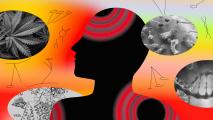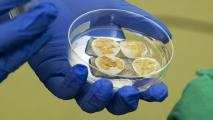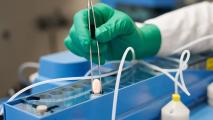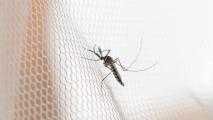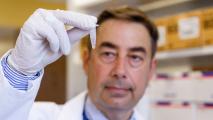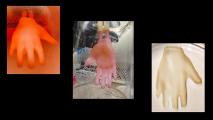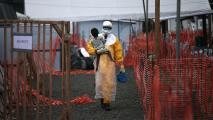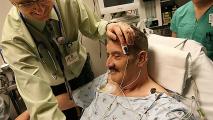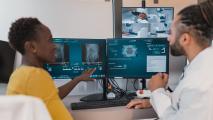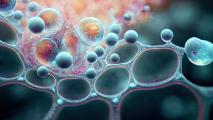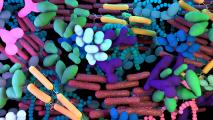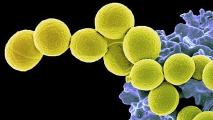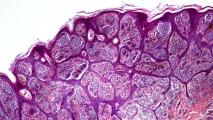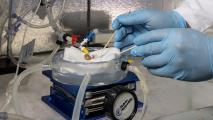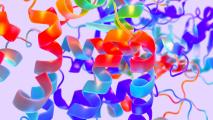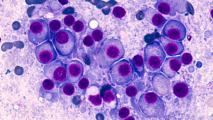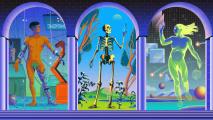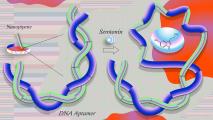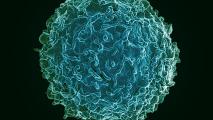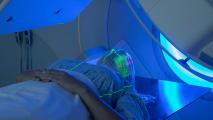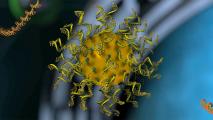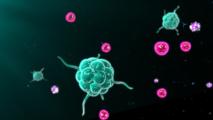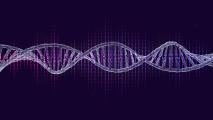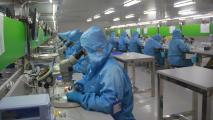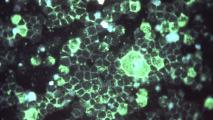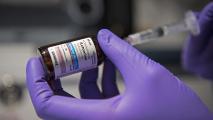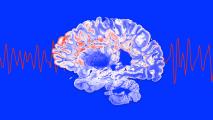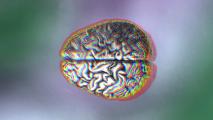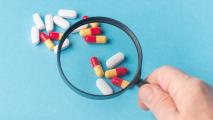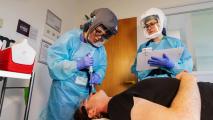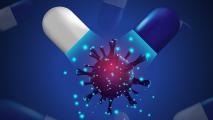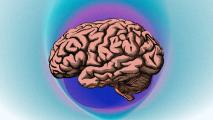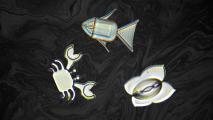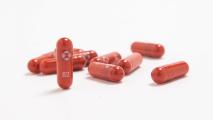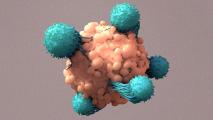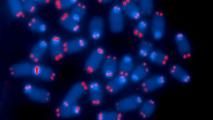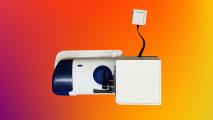Showing 819 results
CRISPR tool slashes bad cholesterol by 56% in monkeys
Tune Therapeutics has successfully lowered the cholesterol levels of monkeys using a version of CRISPR that doesn’t permanently alter DNA.
How the antidepressant Prozac could treat blindness
Prozac is a widely used antidepressant. Data indicates that the drug could be used to prevent blindness due to macular degeneration.
A malaria-fighting antibody has passed phase 2 trials
An antibody designed to prevent malaria infection has proven effective in phase 2 trials in Mali.
One shot of this COVID-19 drug reduces risk of death by 60%
In-development COVID-19 drug Peginterferon Lambda reduced risk of hospitalization or lengthy emergency room visits by 50% in a phase 3 trial.
The source of a strange anti-cancer compound is found in Florida
Researchers have discovered that common soft corals are the source of a sought-after anti-cancer compound.
Mindfulness can slow down the brain’s aging and more
The benefits of practicing mindfulness carry over into everyday life – even when you aren’t actively meditating.
Could switching off a neural “death response” slow aging?
A sensory mechanism that governs how quickly flies age may also have a corollary in people.
Researchers brew a stronger concrete using — coffee?
Researchers and engineers from RMIT University made concrete 30% stronger in the lab by incorporating aggregates made from coffee grounds.
Yale study of DMT for depression is encouraging
Yale researchers have conducted a small study finding DMT is safe and tolerable enough for more research.
AI and the future of work in 2024
Future jobs will rebalance technology with humanity, and lifelong learning to continually upgrade must replace outdated ideas of static careers.
Psychedelics, brain implants, and the future of chronic pain relief
The future of chronic pain relief could include psychedelics, gene therapies, brain implants, and other cutting-edge alternatives to opioids.
Baby thrives after first-of-its-kind heart transplant
A baby’s first-of-its-kind heart transplant could help future patients avoid organ rejection and reduce the need for immunosuppressant drugs.
How we treat inflammation may be causing chronic pain
Reversing common belief, researchers at McGill say treating inflammation may be causing chronic pain, not preventing it.
America’s “Test to Treat” has failed. Here’s how to fix it.
So far, Test to Treat has largely failed to get antivirals for COVID-19 to patients that need them — but the initiative can still be fixed.
How three kids got kidney transplants without immunosuppressants
Stanford researchers have developed a new technique that allowed three children to receive kidney transplants without immunosuppressants.
Scientists use CRISPR to add an alligator gene into catfish
By using CRISPR to insert an alligator gene into catfish, Alabama scientists radically increased their disease resistance.
Mark Cuban launches online pharmacy to cut drug prices
Billionaire investor Mark Cuban has launched an online pharmacy designed to cut the cost of generic drugs by as much as 99%.
Series|
Catalysts
This restaurant only hires recovering drug users
In partnership with Stand Together
After addiction killed 13 of their employees, this restaurant devoted itself to helping people in recovery.
Series|
Heretics
Should extreme biohacking be a human right?
“I want to genetically modify humans. I want to create a coronavirus vaccine in my kitchen. Because I can. Because it’s beautiful and cool. But like, you can’t say that shit.”
Theory of mind: What chess and drug dealers can teach you about manipulation
Every social interaction is a game of chess, trying to get inside someone’s head to navigate what they are thinking or what they will do.
Aging is complicated – a biologist explains why no two people or cells age the same way
While some people may be older in chronological age, their biological age might be much younger. A biologist explains why.
Series|
Challengers
At-home ketamine therapy — are you ready?
Will this at home “tripping kit” change mental health forever?
Drug that cleans up cholesterol may reduce post stroke dementia
Researchers look to an FDA-approved drug ingredient that can "scoop-up" and store cholesterol and possibly stave off post stroke dementia.
In a first, scientists use AI to create brand new enzymes
In a scientific first, researchers have created brand new enzymes designed with the help of AI.
AI maps psychedelic “trip” experiences to regions of the brain – opening new route to psychiatric treatments
To better understand how these effects manifest in the brain, we analyzed over 6,000 written testimonials of hallucinogenic experiences.
Scientists discover possible precursor to a Parkinson’s drug
Scientists have optimized a peptide known to prevent the “protein misfolding,” that causes Parkinson’s disease. This could be a precourser to a disease treatment.
New children’s malaria treatment clears out infection in liver
Malaria can hide in the liver, causing relapse months or years later. Now, public health officials have a new treatment to prevent relapse for children under 16.
There is now a blood test for anxiety disorders
A new blood test for anxiety may be able to help doctors diagnose patients and find effective treatments for them more quickly.
Mindfulness: New age craze or science-backed solution?
Research shows mindfulness can be an effective wellness practice, yet the effect sizes found in studies tend to be moderate.
Skin grafts can now be 3D-printed to fit “like a glove”
Bioprinted skin grafts come in sheets, not the contours of the body. New research from Columbia envisions grafts which fit like a glove.
Moderna to develop mRNA vaccines for Ebola
Moderna is reportedly nearing a deal with the DoD to develop mRNA vaccines for biological threats like Ebola
It’s time to change how we think about electroshock therapy
Electroconvulsive therapy is more effective than ketamine at treating severe depression, according to a new meta-analysis.
One way to speed up clinical trials: Skip right to the data with electronic medical records
It takes around 17 years for medical research to translate into clinical practice — why not use EMR data to speed things up?
Injectable gel repairs severe spinal cord injuries and enables mice to walk
An injectable gel that prevents scar formation and stimulates regeneration successfully repaired severe spinal cord injuries in mice.
Harm reduction vending machines are coming to New York
New York City has announced a pilot program installing public health vending machines with overdose drugs and clean needles.
These are the next big breakthroughs in medicine
In partnership with Intuitive
These companies are working to change the future of health care.
How patients are using technology to kick-start a healthcare revolution
Susannah Fox, former chief technology officer for the HHS, explains how technology can empower a patient-led healthcare revolution.
Ex-NASA engineer Mark Rober created the world’s smallest Nerf gun — from DNA
Mark Rober and Pallav Kosuri created a Nerf gun so tiny they had to build it out of DNA. This DNA "origami" has the potential to revolutionize engineering.
Nanobots are real, and they can battle bacteria
Researchers have developed antibiotic nanobots that can traverse a wound on their own.
Genes from over 5,000 stroke patients hint at surprising treatment
A study of nearly 6,000 stroke patient genomes suggests a treatment idea abandoned for decades should get a second look.
ISS experiment will 3D print a body part in microgravity
An International Space Station experiment to test 3D-printing in microgravity could help end the organ shortage on Earth.
Canada approves psychedelic therapy
A new amendment approving psychedelic-assisted therapies on a case-by-case basis has taken effect.
Microbiome-safe method could head off Staph infection
A microbiome-friendly method of controlling Staph colonization has aced phase 2 clinical trials.
AI could help cancer patients avoid a deadly recurrence
A new study found that AI can use a patient’s initial skin cancer growth to predict their risk of melanoma recurrence.
Cryogenically frozen organs successfully transplanted into rats for the first time
Thanks to a new "nanowarming" technique, scientists have successfully transplanted cryogenically frozen organs into rats for the first time.
Researchers want to fight cancer — by mutating it even more
Sloan Kettering researchers have proposed a controversial way to improve immunotherapy: making cancer cells mutate on purpose.
Traditional Thai cannabis cooking is back on the menu
Cannabis cooking has long simmered in Thailand. With the ruling junta’s new drug policies, the traditional dish is now making its way onto restaurant plates.
A new way to swiftly eliminate micropollutants from water
Scientists at MIT are using zwitterionic hydrogels to sustainably capture both organic and inorganic micropollutants from water.
DeepMind’s AI lights path to faster drug development
Alphabet has announced the launch of Isomorphic Labs, an AI-driven drug discovery company built on research from its DeepMind subsidiary.
New antibody therapy works for 73% of multiple myeloma patients
A new multiple myeloma therapy that uses an antibody to bring T cells to the cancer has shown efficacy in clinical trials.
Rhode Island will be the first state to open safe drug consumption sites
In an important test of drug harm reduction techniques, Rhode Island is set to become the first state to open safe consumption sites.
Transhumanism: Savior of humanity or false prophecy?
While many of the technologies upon which transhumanists base their dream are real and world-changing, they have major limitations.
Shape-shifting DNA is helping researchers decode the human brain
Researcher Nako Nakatsuka has turned to DNA to tackle an important challenge: how do we measure chemicals in the brain?
CRISPR could create a one-shot treatment for HIV
Researchers have used gene editing to engineer HIV-fighting immune cells inside the bodies of mice.
Neuralink’s monkey can play Pong with its mind. Elon Musk says human trials are next.
If Neuralink’s monkey can play Pong with its mind, imagine what humans could do with the same technology in just a few years.
The missing tech case for how we create an era of abundance
AI and other new technologies could make things that are costly and scarce today, cheap and abundant for all tomorrow.
Made-to-fade tattoo ink keeps cancer therapy from leaving a mark
Henry Ford Health researchers are using temporary tattoo ink to help radiation therapy patients for whom permanent tattoos may not be an option.
Scientists have discovered how to make almost any vaccine more potent
An approach called “rational vaccinology” could allow us to design more powerful vaccines, just by rearranging their ingredients.
A new therapy sends lupus into remission
Five patients in Germany had their lupus wiped out by CAR T-cell therapy.
DNA used to make the world’s tiniest “radio”
Scientists have created the world's smallest antenna, measuring only five nanometers in length. It is designed to decipher real-time changes in proteins and records and transmits data via light signals.
Psychosomatic illness: Are some diseases caused by our memories?
The brain appears to remember immune responses, and memories can trigger them to happen again.
Blockchain experts are funding research that Big Pharma won't
Decentralized autonomous organizations (DAOs) use smart contracts on blockchains to change how scientific research is funded and shared.
Space could be a trillion dollar industry by 2040
Now that falling launch costs are making space more accessible, hundreds of groups are looking for ways to make money off-world.
Pfizer’s RSV vaccine is 86% effective at preventing severe illness
According to a huge phase 3 trial, Pfizer’s RSV vaccine is nearly 86% effective at preventing severe illness in older adults.
A chemical in grape seeds extends lives of mice by 9%
A chemical in grape seeds extended the lives of old mice, made young ones healthier, and helped chemo drugs shrink tumors in a new study.
Ketamine therapy may help former drinkers stay abstinent
A new study has found evidence that ketamine, combined with therapy, can help people with alcohol addiction abstain longer.
Male birth control pill to enter human trials in 2022
Clinical trials of a male birth control pill that was 99% effective at preventing pregnancy in mice are expected to launch in 2022.
The neurons that make us feel hangry
Researchers gave pinpointed a cluster of cells called AgRP neurons near the underside of the brain that may create “hangry” feelings.
MIT researchers can fit more drug in less pill
A new drug formulation method developed by chemical engineers at MIT can fit more drug into less pill.
FDA authorizes updated COVID-19 boosters
The FDA has authorized Pfizer-BioNTech’s and Moderna’s updated COVID-19 boosters, which target the now-dominant Omicron subvariants.
Small wonders: The antibodies from camels and sharks that could change medicine
A handful of animals make a pared-down version of our own antibodies. Scientists hope to harness them as treatments for human illnesses.
MIT is testing light and sound to combat Alzheimer’s
MIT researchers are developing a therapy that uses 40-Hz light and sound to alter Alzheimer’s patients’ gamma waves.
New epilepsy treatment could stop seizures in their tracks
A new epilepsy treatment that's delivered as a nasal spray may be able to prevent seizures or even interrupt them.
Are near-death experiences just psychedelic trips?
One possible explanation of near death experiences is that our brains are flooded with a hallucinogenic, DMT.
FDA may soon allow pig organ transplant trials
With pig transplantation looking increasingly viable, the FDA may soon allow clinical trials of the technique to begin.
What the Russian invasion means for clinical trials in Ukraine
Russia’s invasion has the potential to disrupt clinical trials in Ukraine, warns one of the many companies staging trials in the nation.
Psilocybin treatment relieves depression in largest trial yet
The largest psilocybin treatment trial to date suggests that the psychedelic drug can help people with treatment-resistant depression.
Volunteers were purposefully infected with COVID-19. Was it worth it?
It has been a year since the first COVID human challenge data was published. What did we learn, and can HCTs prepare us for the future?
Military vet’s lightweight mask is protecting soldiers from toxic fumes
A Canadian military veteran's innovative mask is protecting soldiers, police, and first responders from toxic exposure.
How natural “short sleepers” thrive on 4 hours of sleep per night
Natural "short sleepers" thrive on only four to six hours of sleep per night. Could their genetics explain why?
Antiviral reduces COVID-19 hospitalizations by 87%
The FDA-approved antiviral drug remdesivir prevents high-risk people from ending up in the hospital, if given early.
“BioDome” triggers near-complete limb regeneration in frogs
A new limb regeneration treatment allowed adult African clawed frogs to regrow near-complete functional legs following amputation.
When remains are found in a suitcase, forensics can learn a lot from the insects trapped within
The investigation of human remains in a suitcase can often represent a Pandora’s box, full of complicated problems.
Pfizer’s antiviral pill cuts COVID-19 hospitalization, death by 89%
Pfizer’s antiviral pill to treat COVID-19 cut the risk of hospitalization or death by 89%, according to early results from a phase 2/3 trial.
New antidepressant helps patients in just three days
Adding the new antidepressant zuranolone to standard treatments helped people with major depressive disorder feel better in less time.
How neuroscience can make us better parents
Kids' brains develop in four main stages. Each has its own particular set of advancements and challenges for parents.
UK tries cancer meds by drone
The UK’s National Health Service (NHS) is using drone deliveries to make it easier for cancer patients to obtain chemotherapy.
Apple Watch now approved to track Parkinson’s symptoms
Apple Watch motion data will now be incorporated into Rune Labs’ StrivePD app, which tracks Parkinson’s symptoms.
Psychedelics can change how you think about the universe
A new study finds that a single trip on a psychedelic can cause lasting changes in a person's metaphysical beliefs.
Microbots in your blood could help destroy cancer
Shape-shifting, magnetic microbots could become assassins for cancer — destroying tumors without the usual collateral damage on the rest of the body.
Chinese robot clones pigs with no human help
A robot that automates a common technique for animal cloning has been used to produce a litter of pigs in China.
Already-approved ALS drug may help Alzheimer’s patients
A small phase 2 study has found evidence that ALS medication riluzole may have potential as a drug for Alzheimer’s.
Merck is making its COVID-19 antiviral pill more affordable to low-income countries
Drug maker Merck has agreed to license a promising antiviral pill to treat COVID-19 to low- and middle-income countries for free.
New CRISPR cancer treatment tested in humans for first time
A new personalized CRISPR cancer treatment modifies the immune system's T cells to help them recognize a specific patient's tumor cells.
Horseshoe crabs are drained for their blue blood. That practice will soon be over.
One of humanity’s strangest and most macabre activities is slowly coming to an end, a trend that every horseshoe crab should celebrate.
For the first time, scientists can switch cancer-fighting cells on and off
While it can be effective, CAR-T cancer therapy can also cause dangerous side effects. But a new on/off switch could change that.
Cells become zombies when the ends of their chromosomes are damaged
Damage to the ends of the chromosomes can create “zombie cells” that are still alive but can’t function, researchers say.
How do researchers study the prevalence of mental illnesses?
Data on mental health is essential to understand the scale of mental illnesses. How do researchers collect this data, and is it reliable?
This device can automatically detect and reverse opioid overdoses
Researchers at the University of Washington have developed an AI-powered wearable to detect, and reverse via naloxone injection, opioid overdoses.
